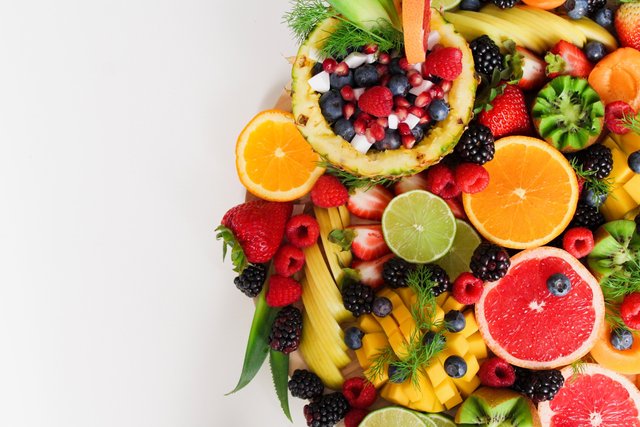Why I Support The Raw Vegan Diet

Before I start extolling the virtues of a raw vegan diet, let me begin by acknowledging that we are all different. What works for me will not necessarily work for you, and vice versa. As individuals, we need to find what works for us, and that applies to what we eat as much as anything else. I do not believe in a 'one size fits all' approach. That said, I believe that 'you are what you eat', and eating a diet high in raw plant based foods has for me been one of the key missing links in my health and well-being.
As we are the only species on the face of the earth who cooks our food before eating it, I think it's important to educate ourselves on what heating our food does to it on a molecular level. If nature wanted us to cook our food, she would have had the foresight to design us with stoves attached to our bodies. As that is other than the case, lets take a quick look at the process known as 'cooking'.
We know when heating macro-nutrients above a certain point, irreversible chemical changes begin to occur. Fats become rancid, Proteins denature, and Carbohydrates can form high levels of cancer promoting acrylamide1 . Perhaps one of the key overlooked observations of eating plant foods in their whole natural state, is the presence of enzymes. Enzymes are molecules needed for almost all biochemical reactions in living things. In other words you could say Enzymes = Life. When we heat food above around 118 Fahrenheit, enzymes begin to deteriorate. This is about the temperature where water becomes too hot to touch. In raw living plant foods such as fruits, leafy greens, sprouted nuts and seeds, enzymes are very much present which help us to digest our food. In simplest terms, this means that our body requires less work breaking down and digesting these foods2. This translates to more energy after eating, instead of feeling lethargic which is often the case after a dense cooked meal.
Upon examining the human body and our digestive system, most of us can agree we are other than biologically equipped to be flesh eaters. Based on research I have done of over the years, it is my belief humans evolved largely as frugivores, which is to say fruit eaters, much like our primate siblings. The 80/10/10 diet by Dr. Douglas Graham is an excellent book in which he lays out the case for this being our evolutionary diet. That being said, it is clear humans have been eating flesh for sometime now, and I do believe that increased caloric intake from cooking our food as well as the essential fatty acids (EFA's) from meats lead to our accelerated evolution. My response to this is that we live in the 21st century, and since we have an awareness of the importance of EFA's and other nutrients like B12 that are lacking in a vegan diet it is not difficult for us to supplement with these nutrients (Dr. Graham explains in his book how we evolved obtaining B12 from the soil). In fact we are now capable of sourcing Docosahexaenoic acid (a type of omega 3 EFA), from sea algae.
Dr. David Jubb is another researcher who I highly respect in the field of life food nutrition. While to many his theories may seem too far out, I believe he has a unique understanding of the human body based on his work in the ever expanding field of darkfield microscopy. Dr. Jubb has done meticulous research analyzing live blood and tiny particles which conventional science has termed 'nanobacteria'. While the jury is still out as to whether these nanobacteria are tiny life forms, it is his belief that they are the smallest units of life yet discovered, which he has termed the Colloid of Life (see my article on colloidal biology here). Based on experimentation which he carried out with Gaston Naessens, he observed that these life colloid go through a 3 stage pleomorphic cycle in a person with a healthy blood terrain, and a 12 stage dysbiotic cycle in a person who's blood is other than such3. Regardless of whether these tiny microorganisms meet the criteria for 'life', one thing is very clear. When a person optimizes their blood terrain by eating a whole food diet rich in life food, the replication cycle can be kept in check. Too much of the wrong food and our blood quickly develops bacteria, mould, fungus and yeast, all of which are the chief undertakers of the body4. Even conventional science recognizes that these nanobacteria are the cause of pathological calcification in the body5, calcification being more and more accepted as the root cause of many of today's 'incurable' diseases.
As with anything, the importance of balance in our diet and lifestyle cannot be overstated. Certainly, people can be very healthy eating small amounts of meat or cooked food. Black and white, all or nothing thinking is usually self defeating. We must remember to always be kind and gentle to ourselves. Through trial and error I have learned that I simply thrive on a diet where 80-90% of the food I eat is raw, plant based, and alive. David Wolfe, one of the key personalities in the raw vegan health movement coined the mantra 'today is the best day ever!'. Whether psychosomatic or not, in order for me to have the 'best day ever' almost every single day, the answer always seems to bring me back to one thing. Eat more raw living food.
1 - https://www.cancer.gov/about-cancer/causes-prevention/risk/diet/acrylamide-fact-sheet
2 – Enzyme Nutrition 1995: Dr. Edward Howell
3 - http://customers.hbci.com/~wenonah/new/somatid.htm
4 – Jubbs Cell Rejuvenation 2006: Dr. David Jubb
5 - https://academic.oup.com/ndt/article/26/11/3436/1833065
-Brian Johnson
Brian Johnson is a writer for, and founder of Elysium Project. A collective of individuals passionate about fostering positive social and spiritual change in the 21st Century.